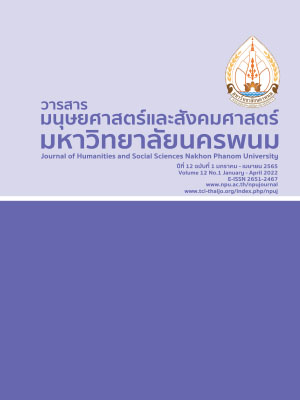Necessity for Assessment of Collaborative Educational Management for Private School
Main Article Content
Abstract
The purpose of this research was to examine the current and desirable conditions and necessity of collaborative educational management of private schools. This research quantitative methodology was applied to analyze the data. The population was included totally 3,937 general private schools in Thailand. The selective 363 samplings in this study were the schools that provide teaching and learning in basic education under the Office of the Private Education Commission by using multi-stages of random sampling. Research tools were 5-rating scale questionnaires. , 30 sets of pilot study were tested by samples to assess the reliability of research tool, the reliability result of 0.97. 1. The overall current educational management of private schools reached a high level. While considering each component individually, the result showed that mean of shared governance was highest, whereas the lowest mean was shared resources. The overall desirable educational management of private schools reached a high level. While considering each component individually, the result suggested that mean of shared governance was highest, whereas the lowest mean was shared resources. 2) The necessity for development of collaborative educational management for private education was revealed through the PNIModified at 0.09-0.13. In this figure, the prioritized necessity for development included shared resources, networks building, shared goals, joint work and shared responsibilities, and shared governance, respectively.
Article Details

This work is licensed under a Creative Commons Attribution-NonCommercial-NoDerivatives 4.0 International License.
References
Armstrong, P. W., & Ainscow, M. (2018). School-to-school support within a competitive education system: views from the inside. School Effectiveness and School Improvement, 29(4), 614-633. doi:10.1080/09243453.2018.1499534
Azorin, C. M., & Muijs, D. (2017). Networks and collaboration in Spanish education policy. Educational Research, 59(3), 273-296.
Conderman, G., & Hedin, L. (2017). Two co-teaching applications: Suggestions for school administrators. Kappa Delta Pi Record, 53(1), 18-23.
Goolsby, D. M., Bohannon, M., & McDavid, K. (2019). Shared Governance and Activism: The Importance of Campus Collaboration for Marginalized Students.
Gu, Q., Rea, S., Smethem, L., Dunford, J., Varley, M., Sammons, P., P., Parish, N., Armstrong, P. and Powell, L. (2016). Teaching schools evaluation: Final report. London: Department for Education.
Helgetun, J. B., & Menter, I. (2020). From an age of measurement to an evidence era? Policy-making in teacher education in England. Journal of Education Policy, 1-18.
Johnson, C. C., Mohr-Schroeder, M. J., Moore, T. J., & English, L. D. (Eds.). (2020). Handbook of Research on STEM Education. New York : Routledge.
Liu, J. (2018). Constructing resource sharing collaboration for quality public education in urban China: Case study of school alliance in Beijing. International Journal of Educational Development, 59, 9-19.
Newell, C., & Bain, A. (2018). Defining Collaboration and Previewing Success Factors for Effective Collaboration. In Team-Based Collaboration in Higher Education Learning and Teaching (pp. 9-27). Springer: Singapore.
Ngampakon S., Chaisuk P., Phrakhruphattharadhammakun, Phramaha Sombat Dhanapañño, Sangnont K. (2019). kānbō̜rihān kānsưksā : nǣokhit thritsadī læ rūpbǣp kānbō̜rihān čhatkān [Educational Administration : Concept Theory and Management]. Journal of Educational Review Faculty of Education in MCU, 6(3), 134-146.
[สิน งามประโคน, พีรวัฒน์ ชัยสุข, พระครูภัทรธรรมคุณ ปั้นมยุรา, พระมหาสมบัติ ธนปญฺโญ, เกษม แสงนนท์ และ อำนวย เดชชัยศรี. การบริหารการศึกษา : แนวคิด ทฤษฎีและรูปแบบการบริหารจัดการ. วารสารครุศาสตร์ปริทรรศน์ คณะครุศาสตร์ มหาวิทยาลัยมหาจุฬาลงกรณราชวิทยาลัย, 6(3), 134-146.]
Pasunon P. (2016). khwām thīangtrong khō̜ng bǣpsō̜pthām samrap ngānwičhai thāng sangkhommasāt [Validity of questionnaire for social science research]. Journal of Social Sciences Srinakharinwirot University, 18(1), 375-396.
[ประสพชัย พสุนนท์ (2558). ความเที่ยงตรงของแบบสอบถาม สำหรับงานวิจัยทางสังคมศาสตร์. วารสารสังคมศาสตร์ มหาวิทยาลัยศรีนครินทรวิโรฒ ปีท่ี 18 ฉบับเดือนมกราคม-ธันวาคม 2558, 375-396]
Ricci, L. A., Zetlin, A., & Osipova, A. V. (2017). Preservice special educators’ perceptions of collaboration and co-teaching during university fieldwork: Implications for personnel preparation. Teacher Development, 21(5), 687-703.
Wongwanich, S. (2007). kānwičhai pramœ̄n khwāmtō̜ngkān čhampen [Needs assessment research]. Bangkok: Chulalongkorn University.
[สุวิมล ว่องวาณิช. (2548). การวิจัยประเมินความต้องการจำเป็น. กรุงเทพฯ:สำนักพิมพ์แห่งจุฬาลงกรณ์ มหาวิทยาลัย.]
Zaslow, M., Tout, K., & Halle, T. (2018). Toward the Identification of Features of Effective Professional Development for Early Childhood Educators. Office of Planning, Evaluation and Policy Development, US Department of Education, 2010. https://eric.ed.gov/?id=ED527140


